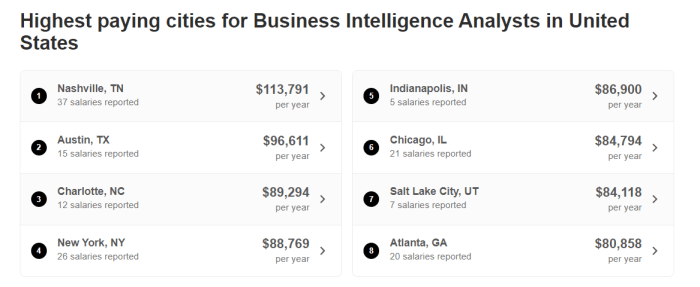Business intelligence analyst entry level salary – When it comes to entry-level salaries for business intelligence analysts, the numbers can vary widely. This guide will delve into the factors that influence these salaries, explore industry and location trends, and provide insights into the educational and experience requirements for these in-demand professionals.
From understanding the role of business intelligence analysts and its significance in modern organizations to analyzing the impact of education and experience on entry-level salaries, this comprehensive guide will equip you with the knowledge you need to navigate the job market and maximize your earning potential.
Overview of Business Intelligence Analyst Entry-Level Salary
In today’s data-driven world, businesses rely heavily on business intelligence analysts to gather, analyze, and interpret data to make informed decisions. These professionals play a crucial role in driving business growth and optimizing operations.
Business intelligence analysts are in high demand, with entry-level salaries averaging around $60,000. If you’re interested in a career in business intelligence, you may want to consider specializing in Looker business intelligence , a popular data analytics platform.
With Looker, you can quickly and easily analyze large amounts of data to identify trends and patterns that can help your business make better decisions.
This specialization can give you a competitive edge in the job market and increase your earning potential.
Entry-level business intelligence analysts typically have a bachelor’s degree in a related field, such as business analytics, computer science, or statistics. They may also have experience working with data analysis tools and techniques.
The factors that influence entry-level salaries for business intelligence analysts include education, experience, industry, and location. Let’s explore each of these factors in more detail.
Salary Expectations by Industry
The industry in which a business intelligence analyst works can significantly impact their salary. Some industries, such as technology and finance, tend to pay higher salaries than others.
- Technology: $65,000-$80,000
- Finance: $60,000-$75,000
- Healthcare: $55,000-$70,000
- Retail: $50,000-$65,000
- Manufacturing: $50,000-$60,000
Salary Expectations by Location

The location of a business intelligence analyst’s job can also affect their salary. Salaries tend to be higher in large metropolitan areas, such as New York City and San Francisco, than in smaller cities and towns.
- New York City: $75,000-$100,000
- San Francisco: $70,000-$95,000
- Chicago: $60,000-$80,000
- Dallas: $55,000-$75,000
- Atlanta: $50,000-$70,000
Education and Experience Requirements, Business intelligence analyst entry level salary
The education and experience of a business intelligence analyst can also impact their salary. Candidates with a master’s degree or higher typically earn more than those with a bachelor’s degree.
If you’re looking to start your career as a business intelligence analyst, you’ll likely want to research the potential salary you can earn. While the exact figure will vary depending on your experience and location, you can get a good idea of the average entry-level salary by visiting websites like blog.dosenpintar.com business intelligence.
Once you have a better understanding of the salary expectations, you can start applying for jobs and negotiating your salary with confidence.
- Bachelor’s degree: $50,000-$65,000
- Master’s degree: $60,000-$75,000
- PhD: $70,000-$85,000
Experience in data analysis, business intelligence tools, and programming languages can also increase an analyst’s salary.
Benefits and Perks
In addition to salary, business intelligence analysts may also receive a range of benefits and perks, such as:
- Health insurance
- Dental insurance
- Vision insurance
- Paid time off
- Tuition reimbursement
- Stock options
Career Growth and Advancement Opportunities

Business intelligence analysts have the opportunity to advance their careers in a variety of ways. With experience and additional education, they can move into management positions, become data scientists, or specialize in a particular industry or domain.
Some common career paths for business intelligence analysts include:
- Business intelligence manager
- Data scientist
- Industry analyst
- Consultant
- Entrepreneur
Concluding Remarks: Business Intelligence Analyst Entry Level Salary

Whether you’re a recent graduate or a seasoned professional looking to transition into the field of business intelligence, this guide has provided valuable insights into the entry-level salary landscape. Remember, the key to success lies in continuous learning, networking, and embracing the ever-evolving nature of the industry. As you progress in your career, your salary will naturally grow, reflecting your contributions and expertise.
FAQ
What are the common benefits and perks offered to entry-level business intelligence analysts?
Benefits and perks may include health insurance, paid time off, flexible work arrangements, professional development opportunities, and bonuses.
How can I increase my earning potential as a business intelligence analyst?
When starting out as a Business Intelligence Analyst, it’s important to understand the basics of Business Intelligence (BI). BI is the process of gathering, analyzing, and interpreting data to help businesses make better decisions. This can involve anything from identifying trends and patterns to forecasting future outcomes.
By understanding the fundamentals of BI, you can develop the skills necessary to succeed in this growing field and negotiate a competitive entry-level salary.
Pursuing advanced degrees, obtaining certifications, and gaining experience in specialized areas can enhance your earning potential.
What are the career growth opportunities for business intelligence analysts?
With experience and expertise, business intelligence analysts can advance to senior-level positions, such as business intelligence manager or chief data officer.




